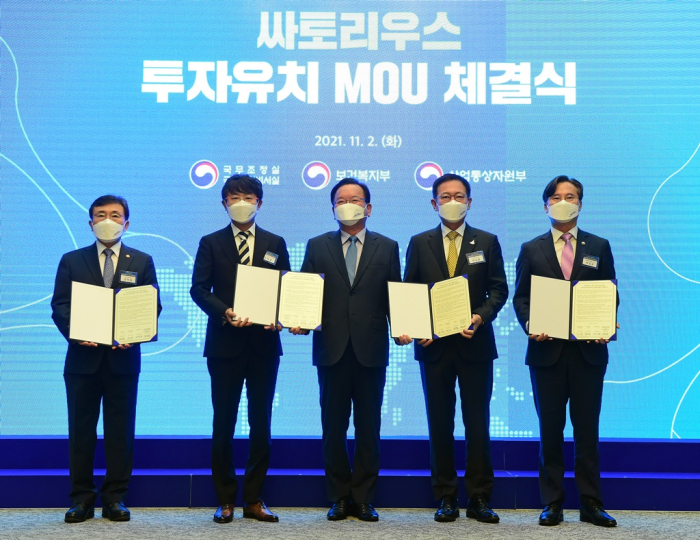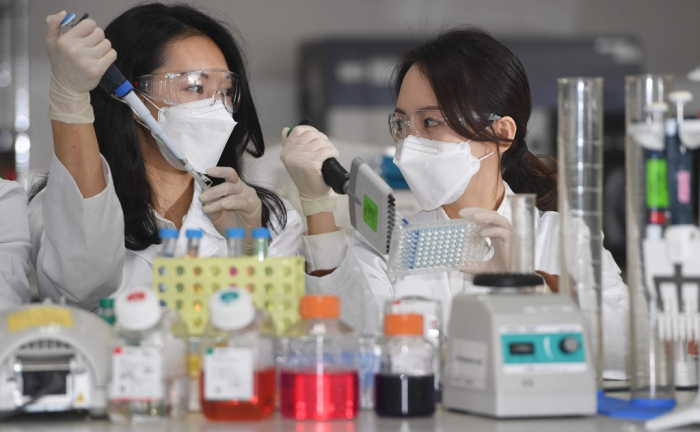Sartorius to invest $300 mn in bio material, equipment plant in Korea
Korea biopharma industry to spend $5.3 billion by 2024 for new plants, research centers
By Nov 03, 2021 (Gmt+09:00)
Alibaba eyes 1st investment in Korean e-commerce platform


Blackstone signs over $1 bn deal with MBK for 1st exit in Korea


NPS loses $1.2 bn in local stocks in Q1 on weak battery shares


OCI to invest up to $1.5 bn in MalaysiaŌĆÖs polysilicon plant


Korea's Lotte Insurance put on market for around $1.5 bn



Sartorius AG, German laboratory equipment and raw material maker, is slated to invest $300 million in the next three years to build a plant in South Korea. The plan is expected to strengthen the countryŌĆÖs status as a global vaccine production hub as global pharmaceutical giants such as AstraZeneca and Moderna Inc already outsourced manufacturing of COVID-19 vaccines to South Korean companies.
The government aims to develop the biopharmaceutical sector as a core business, by removing unreasonable regulations and actively supporting the industryŌĆÖs production and exports.
BIO-CLUSTER
Sartorius on Nov. 2 signed a memorandum of understanding with the Ministry of Health and Welfare, the Ministry of Trade, Industry and Energy, as well as the Incheon Metropolitan City government to set up a factory in Songdo, Incheon. Its major clients such as Celltrion Inc., Samsung Biologics┬ĀCo. and SK Bioscience Co. are operating plants there.
The German pharmaceutical and laboratory equipment supplier plans to manufacture raw materials and equipment such as cell culture bags, cell culture media and pharmaceutical filters, for the production of biopharmaceuticals and vaccines. The company will export those products to the global market.
In September, Cytiva, formerly known as GE Healthcare Life Science, announced a plan to invest $52.5 million to build a cell culture bag plant in South Korea by 2024.
Those investment plans came amid strong growth in South KoreaŌĆÖs biopharmaceutical industry. The country is already home to the worldŌĆÖs leading contract drug manufacturers such as Celltrion.
Samsung Biologics is producing ModernaŌĆÖs COVID-19 vaccine, while SK Bioscience is making AstraZenecaŌĆÖs vaccine. The SK Group affiliate inked a contract development and manufacturing organization (CDMO) order for a vaccine candidate developed by US-based Novavax last year. GC Pharma is in talks with Janssen on vaccine production. Huons Global Co. and Hankook Korus Pharm Co. are manufacturing Russia's Sputnik V vaccine. Production of COVID-19 vaccines is expected to surge once local makers such as SK Bioscience succeed in the development of their own vaccines.
ŌĆ£To create synergy in biopharmaceutical production, related companies should gather and form a cluster,ŌĆØ said an industry source said. ŌĆ£More foreign companies are likely to come to the Songdo bio-cluster centered by Samsung and Celltrion.ŌĆØ

INDUSTRY TO SPEND $5.3 BILLION, GOVERNMENT TO SUPPORT
South Korean bio companies plan to invest a total of 6.3 trillion won ($5.3 billion) by 2024, according to the government.
Among the total, Samsung Biologics┬Āis set to spend 4.2 trillion won to construct three more factories in Songdo. Celltrion is slated to invest 1.5 trillion won in a plant and research center. SK Bioscience set aside 270 billion won for a vaccine research center and Prestige Biologics Co. will spend 226 billion won for a new factory.
To help the industryŌĆÖs growth, the government plans to relax regulations, increase export marketing and provide strategies for global patents.
ŌĆ£The government will also plan to help local companiesŌĆÖ vaccine partners expand from US names to firms in the European Union and ASEAN,ŌĆØ said a government official.
Write to Sang-Hun Oh and Sun A Lee at ohyeah@hankyung.com
Jongwoo Cheon edited this article.
-
 BiotechJW Bioscience in pancreatic cancer biomarker deal with Immunovia
BiotechJW Bioscience in pancreatic cancer biomarker deal with ImmunoviaSep 15, 2021 (Gmt+09:00)
1 Min read -
 Renewable energyLG Chem to set up next-generation bio-oil plant in Korea
Renewable energyLG Chem to set up next-generation bio-oil plant in KoreaSep 02, 2021 (Gmt+09:00)
1 Min read -
 [Exclusive] COVID-19 vaccinesSamsung Bio plans to manufacture mRNA drug substance from 2022
[Exclusive] COVID-19 vaccinesSamsung Bio plans to manufacture mRNA drug substance from 2022May 31, 2021 (Gmt+09:00)
2 Min read -
 COVID-19 vaccine partnershipSamsung Biologics to make ModernaŌĆÖs mRNA vaccine from Q3
COVID-19 vaccine partnershipSamsung Biologics to make ModernaŌĆÖs mRNA vaccine from Q3May 23, 2021 (Gmt+09:00)
4 Min read -
 COVID vaccinesKorean pharmas may turn into global vaccine makers on Biden remarks
COVID vaccinesKorean pharmas may turn into global vaccine makers on Biden remarksMay 07, 2021 (Gmt+09:00)
4 Min read -
 Korea rises as production hub for coronavirus treatments; darling of global pharmas
Korea rises as production hub for coronavirus treatments; darling of global pharmasSep 15, 2020 (Gmt+09:00)
2 Min read -
 SK Bioscience wins COVID-19 vaccine manufacturing order from US firm
SK Bioscience wins COVID-19 vaccine manufacturing order from US firmAug 14, 2020 (Gmt+09:00)
2 Min read


